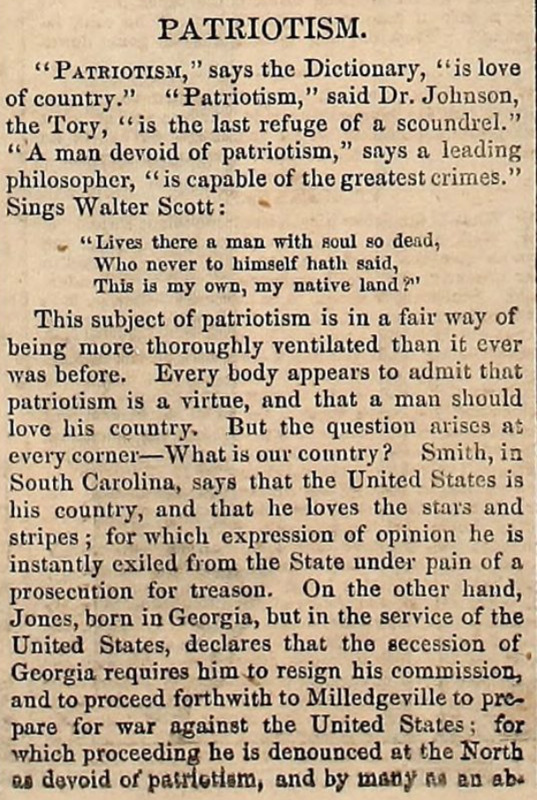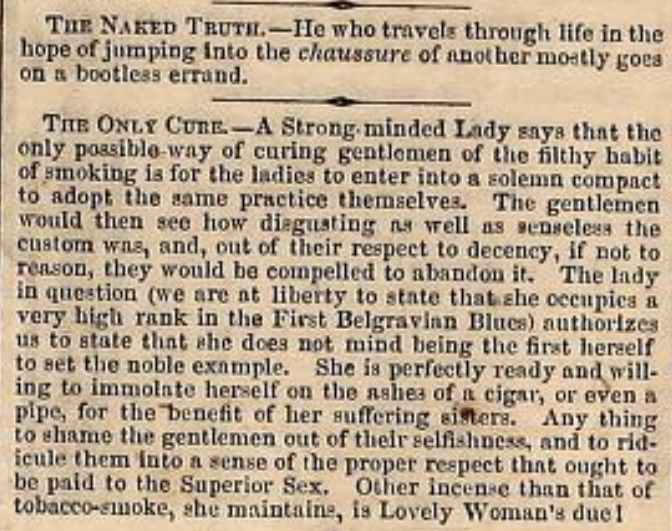Part 14
Introduction
Volume V, No. 218 of Harper’s Weekly was released on March 2nd, 1861, and contains chapter three of Charles Dickens’ Great Expectations Volume II. On March 2nd, the Corwin Amendment was approved by the Senate, an amendment “designed to permanently eliminate or strictly curtail the federal government's ability to abolish or interfere with the institution of slavery anywhere within the United States” (Rierson 69) with the intention of preventing the secession of Southern states. Moreover, March of 1861 was in and of itself considered a pivotal month in American history as the month’s events, such as the inauguration of Abraham Lincoln and the tension between the Southern and Northern states, led to the Civil War. No. 218 of Harper’s Weekly magazine includes several illustrations and news excerpts that provide cultural context regarding America’s historical events at the time which, in simultaneous consideration of the Great Expectations chapter release, help readers shape unique interpretations of the novel’s characters and plot line. The chapter consists of Pip’s amicable reunion with Herbert Pocket, whom he first met at Miss Havisham’s residence over a gentlemanly quarrel and has not interacted with since. Throughout the chapter, readers learn of the truth behind Miss Havisham’s tragic past, Herbert’s career goals as an aspiring capitalist, and the peculiar mannerisms of Herbert’s family members. The chapter is fundamental to the reader’s understanding of how Herbert specifically serves as a foil to Pip’s character development; however, in taking the surrounding magazine items into account, Miss Havisham can also be seen as an effective foil to Pip’s journey towards uncovering his own individualistic identity. Through my study of the magazine items selected below, I plan to argue that equipping the reader with original, political context, not simply in terms of the historical events but also the social and cultural viewpoints upheld by American people during this time, enhances reader understanding of Dickens’ detailed characterization of key foil characters. As a result, readers are not only able to better see the highly distinct, contrastive qualities of Herbert in comparison to Pip but also a social commentary on America's normalized patriarchal views in foiling Pip and Miss Havisham, which without political context, would have been difficult to observe on a critical level.

EUROPEAN OPINION UPON OUR TROUBLES
“EUROPEAN OPINION UPON OUR TROUBLES”, the first full-length excerpt included in the magazine, discusses Europe’s personal input on the current political events happening in the United States (US). The excerpt states that both England and France share the “earnest wish for a peaceable settlement of [US’] difficulties” (Harpers 130) drawing attention to the global implications of US’ political conflicts. As a significant trading partner for many European nations, any political tension in the US, most especially a war, would undoubtedly cause great disruption within the trade industry and inconvenience foreign nations who rely on the wide range of trade goods produced by the Southern and Northern regions of the US. Strictly speaking, any secession or dissolution of regions in the US may create complications within any trade agreements shared between US and other nations, which could lead to unwanted trade barriers and inefficient trade flows. In the magazine’s chapter of Great Expectations, Herbert expresses his career plans to become “A capitalist — an Insurer of Ships” (Dickens 214), reminding American readers at the time of the highly precarious trading industry of the US, especially due to the great prospect of imminent war within the nation. Having been provided with the political context underlying Herbert’s ambitions, readers are able to better understand Herbert’s commendable qualities as a hardworking, humble character. American readers of this time, as well as present-day readers who read Great Expectations via Harper’s Weekly, are able to garner greater sympathy and respect for Herbert’s efforts to achieve financial stability because they are supplied with a better understanding of what it meant to pursue a career in the trade industry through the magazine’s political excerpts that annotate the magnitude of American Trade. By reaching a more thorough understanding of Herbert, he becomes a clearer foil for Pip, who at this point in the story, has a lot to learn from Herbert’s humble pursuit of financial success.

PATRIOTISM
The second excerpt selected is also political, as made evident by its title, “PATRIOTISM”. The passage discusses the concept of patriotism by questioning whether a person can still be considered a patriot of their country if they only express love for a limited region or subsection of their country. Although not explicitly stated, the author seems to be blatantly hinting at the current political conflict brewing between the Southern and Northern states in the US as he outwardly criticizes Thomson, who supposedly only loves his native farm but calls himself a patriot, of selfishness and insincerity. The author’s mentioning of the people of Italy who were “unanimous in favor of national independence” (Harpers 130) but failed to succeed as a unified nation allows readers to infer that the author advocates for national unification when it comes to patriotism, rather than segmented or select patriotism, and is likely encouraging the same outlook for those amidst the Southern-Northern conflict in the US. The political dilemma parallels and sheds light upon Pip’s personal dilemma as he undergoes self-discovery. During his interaction with Herbert, Pip becomes self-conscious over his less gentlemanly mannerisms in comparison to Herbert as he feels great shame over the fact that he “had been brought up a blacksmith in a country place and knew very little of the ways of politeness” (Dickens 210). The theme of Pip’s personal dissatisfaction with his upbringing is recurrent as he struggles to accept his humble beginnings throughout his development. Rather than coming to terms with his upbringing, he feels the need to discard his past which causes him to neglect and often disrespect his loved ones back home with his newly adopted snobbish behavior. Much like the US, Pip is unable to wholeheartedly appreciate his entire self by rejecting a subsection of his identity–his past.

CRABBED AGE AND YOUTH
“CRABBED AGE AND YOUTH” depicts an older man who judgmentally spectates the behaviors of the younger generation. He views them with pity as he remembers his own joyous youth, perceiving their experiences as not nearly as enjoyable or meaningful as his own when he was their age. The schoolgirls are left with “timid doubt” (Harpers 130) over the excitement they felt waiting for their Valentine’s Day cards due to the scolding of the older people around them, therefore interrupting the kids’ pure, childlike enjoyment. The author asks, “Why do we so easily forget that we have been young, and that youth is always the same?” (Harpers 130), encouraging readers to not be critical of the innocent pleasures that those no longer in their youth may not be able to fully grasp, but rather, allow them to bask in their youthful joy and simplicity. The story draws attention to a sentiment that both the old man in the story and Pip have still yet to learn. Pip’s fixation on becoming a gentlemanly person deters him from appreciating his present circumstance and the fortunate cards he has been dealt, such as his loving friends and family. While Pip fantasizes about extravagance and wealth in order to become a successful gentleman, Herbert is satisfied with “the simplest necessaries” (Dickens 216), therefore does not exhibit any form of fixation on an end goal of excessive wealth and material success. In doing so, Herbert’s pursuit of financial comfort is characterized by humility and personal growth, which at this point in the novel, Pip cannot seem to understand or relate to. Even as Herbert describes his career goals, Pip focuses on the financial repercussions of Herbert’s aspirations, by commenting that his pursuits will make it “difficult [for him] to lay by much accumulative capital from such a source of income” (Dickens 216). All in all, Pip’s infatuation with the romanticized lifestyle of what it means to be a gentleman causes him to neglect and look down upon meaningful and sustainable forms of happiness. Consequently, the story, along with the second magazine item, are both examples of allegorical context that set readers up for a better understanding of Pip’s current stage of growth and development.

HUMORS OF THE DAY
The final two magazine items I have selected are both from the “HUMORS OF THE DAY” section of the magazine and in relation to March 2nd’s chapter of Great Expectations, parallel the contrastive characterization techniques used by Dickens when illustrating Miss Havisham and Pip. “THE NAKED TRUTH” figuratively alludes that those who try to succeed by copying or imitating others are fated to fruitless outcomes. Within the context of Great Expectations, the act of imitation is exhibited through Pip, who attempts to pursue happiness by following Victorian society’s superficial definitions of success and impersonating supposedly gentlemanly antics. In this chapter, readers finally learn of Miss Havisham’s past as a woman who was once left at the altar by a man who was suspected to have conspired with her half-brother to take advantage of her wealth. As a woman who had once pursued love over superficial wealth and her own public reputation, she secludes herself from society and gains a reputation as an eccentric, unstable woman after experiencing betrayal and abandonment on her wedding day. Dickens’ choice of characterizing Miss Havisham as a woman who falls into insanity underscores Dickens’, as well as many peoples’, internalized presumption that women who go against society’s expectations are considered senseless and, at times, even psychotic. As a result of pursuing a life that fully discarded public scrutiny and superficial judgment from those around her, Miss Havisham is left with bitterness and reclusion. Alternatively, we later see that it is only when Pip learns to “jump Into the chaussure of another” (Harpers 131) he uncovers a deeper appreciation of his upbringing and sense of self, something Miss Havisham had done by pursuing love over wealth but was handed a very contradictory outcome. Hence, the fully divergent outcomes of Miss Havisham and Pip’s arguable similar pursuits emphasize the patriarchal system of condemning women that prevailed during this period. Following a similar line of thought, “THE ONLY CURE” suggests that the most effective way to help a man to quit smoking is to have a woman take up smoking, which will spotlight how “disgusting” and “senseless” (Harpers 131) the habit of smoking actually is. The joke acknowledges the sentiment that women are far more susceptible to public scrutiny and social condemnation than men simply because of the gendered expectations surrounding women. The paragraph reiterates a feminist commentary on Dickens’ dramatization of Miss Havisham’s tragic outcome and characterization as a socially persecuted woman. Supplied with a cultural understanding of the anti-feminist standards that ruled society at the time, readers can see how Miss Havisham’s tragic life experiences foil Pip’s uphill journey toward meaningful self-discovery.
Conclusion
Although Herbert is commonly identified as a foil for Pip, through the usage of cultural context, readers can draw connections and make critical commentaries regarding the contrasting portrayal and outcomes of both Pip and Miss Havisham. The application of historical and cultural context allows for an in-depth exploration of characterizations that goes beyond the surface level by helping to create layered interpretations that extend to the real world. By applying analyses of a fictional text to real-life socio-political concepts, readers can identify and formulate commentaries about the human condition, therefore using the novel as a tool to come to more meaningful understandings of the world. Each magazine article selected from No. 218 of Harper’s Weekly was studied in integration with the article’s chapter release of Great Expectations to exhibit how context can help readers come to analytical conclusions that otherwise would be difficult to conceive.
Works Cited
Dickens, Charles. Great Expectations. Edited by Graham Law and Adrian J. Pinnington, Broadview Press, 1998.
Rierson, Sandra L. “TRACING THE ROOTS OF THE THIRTEENTH AMENDMENT.” UMKC Law Review, vol. 91, no. 1, 2022, p. 57-134.